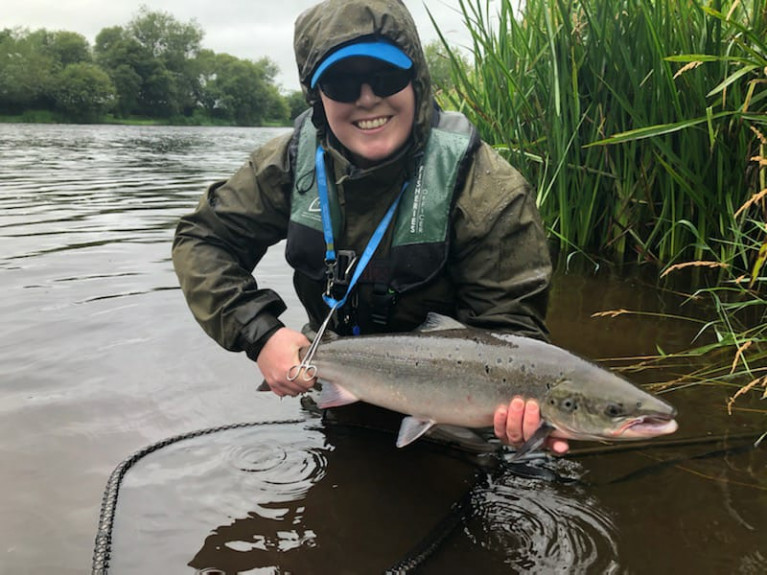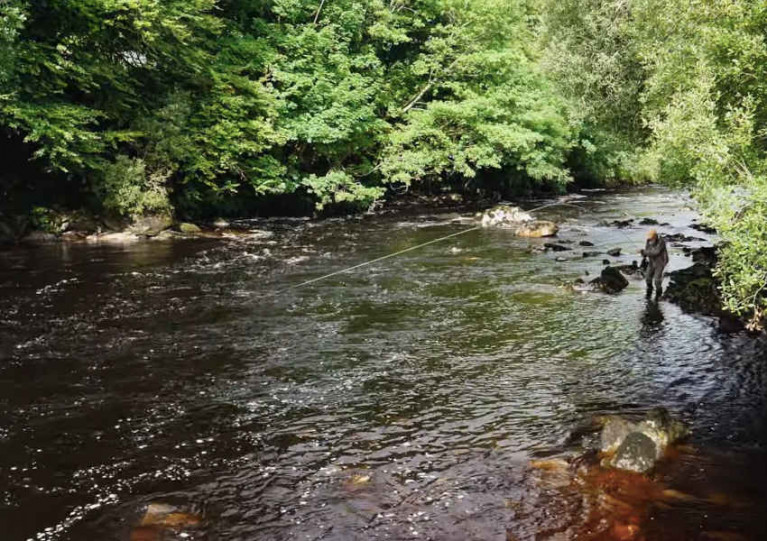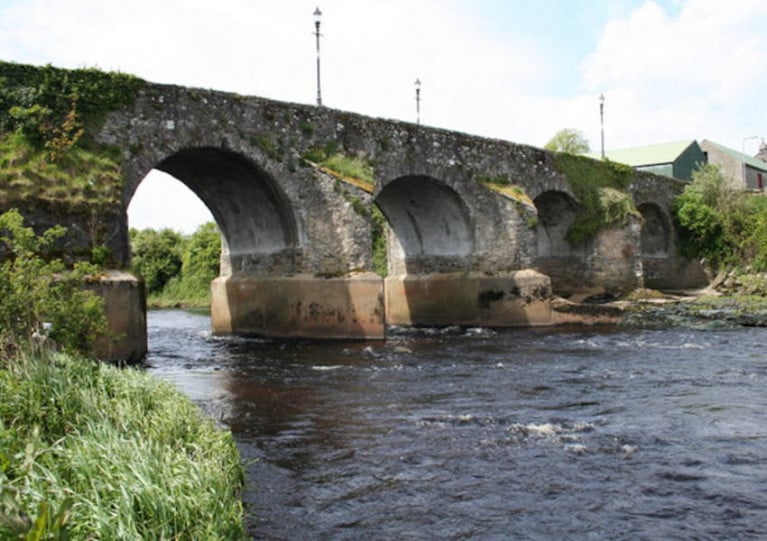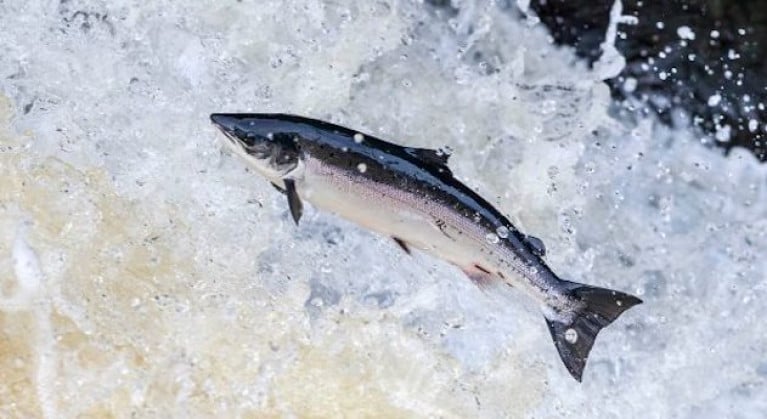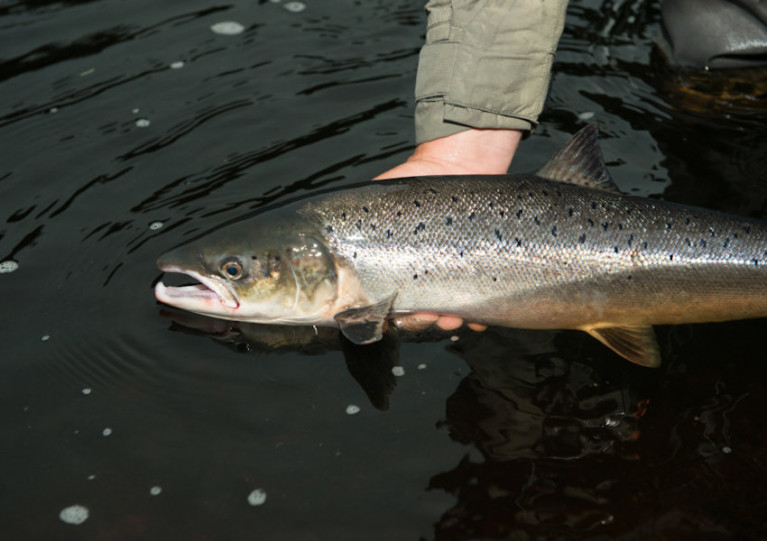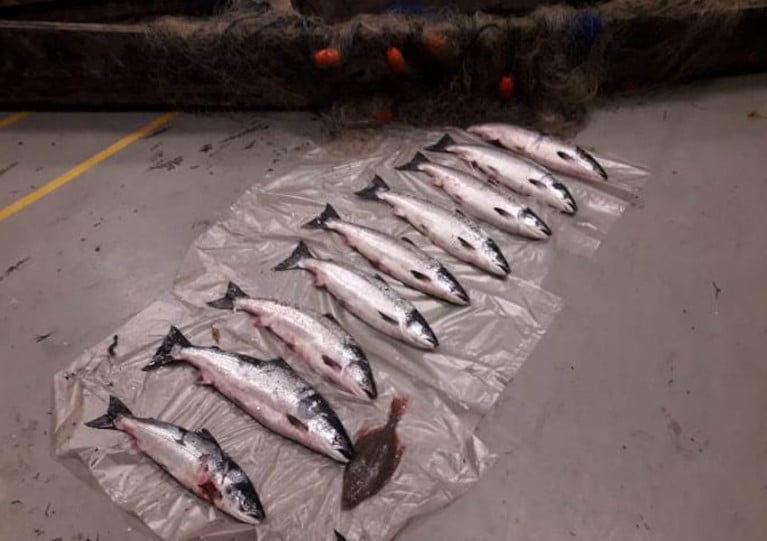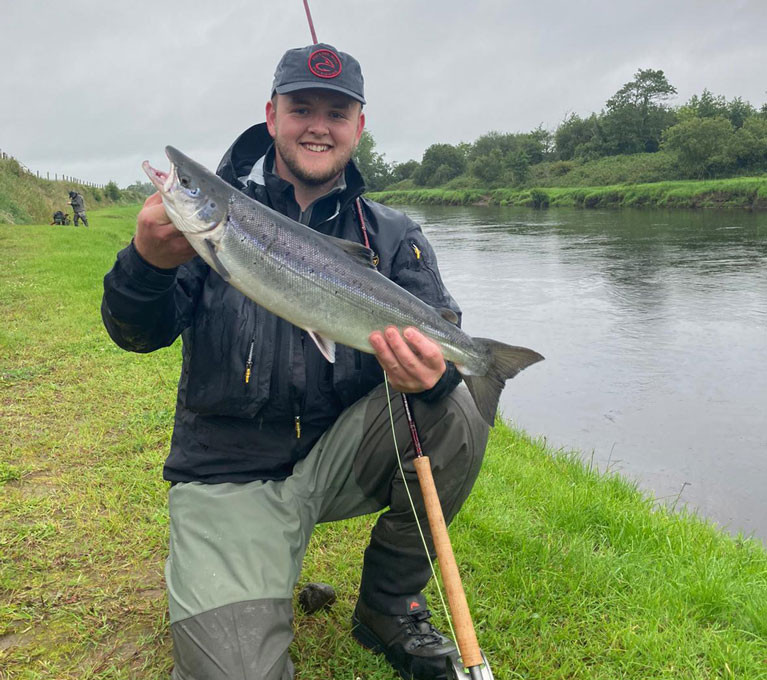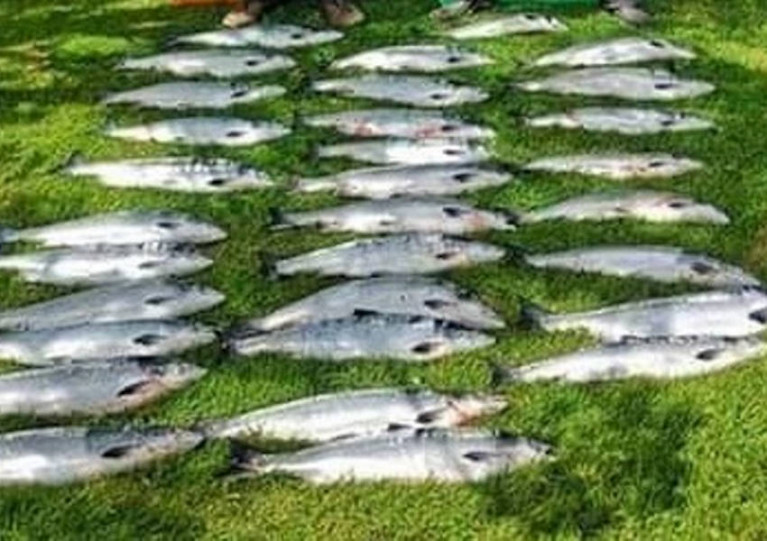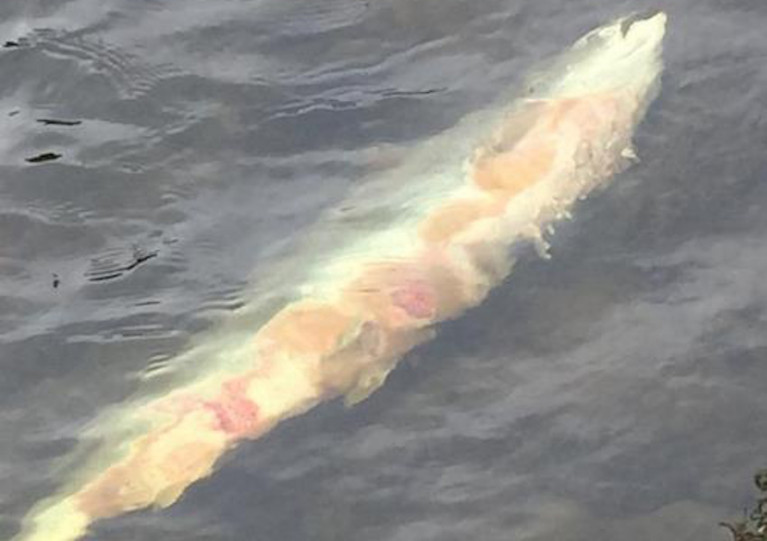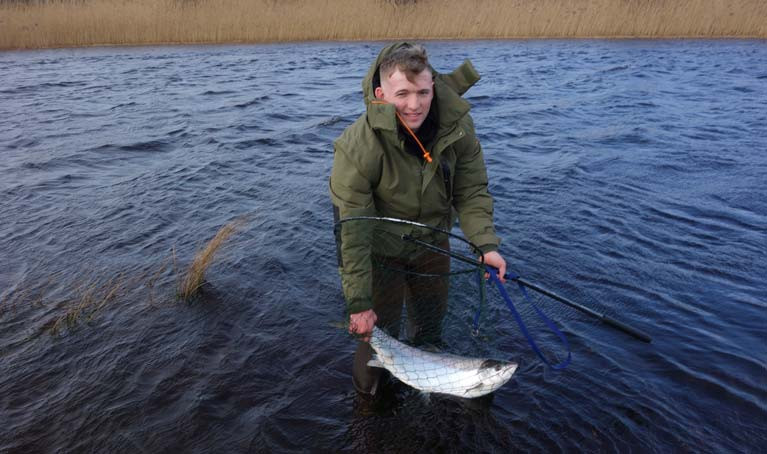Displaying items by tag: Salmon
Salmon & Sea Trout Angling Licences for 2021 Now Available
Inland Fisheries Ireland (IFI) has reopened its sales of salmon and sea trout angling licences for the 2021 season.
E-licences can now be purchased online and will be delivered along with a logbook straight to your phone or computer. Gill tags will be dispatched by post.
There is no price change for salmon and sea trout angling licences this year and licence fees will remain the same across all classes, including those for juvenile anglers.
Anglers are legally required to be in possession of a licence and logbook when fishing for salmon or sea trout. Online licences must be printed off along with the logbook and in the possession of anglers while fishing.
For anglers who require tags on or before Tuesday 5 January, online licences must be purchased on or before Monday 21 December.
Alternatively, angling licences will be available to purchase from approved licence sales distributors from the end of December/early January.
For those anglers who do not require tags in advance of 5 January, online licences and logbooks will be available from the IFI online shop throughout the Christmas period.
Anglers are advised to comply with Government guidelines specific to the region in which they live and wish to travel to. IFI has published updated advice for anglers, who are also reminded to check before travelling as due to Covid-19, working arrangements for distributors and fisheries may have changed.
IFI chief executive Francis O’Donnell said: “We are happy to announce the opening of 2021 licence sales for salmon and sea trout angling. We would like to use this opportunity to recognise the contribution salmon and sea trout anglers make to the sustainability of the resource by paying their licence fee and supporting the Salmon and Sea Trout Rehabilitation, Conservation, and Protection Fund as a result.”
The costs for salmon licences will remain as follows:
- All Districts (ie all Regions) Annual: €100
- Juvenile (under the age of 18 years) All Districts Annual: €10
- One District, Annual: €56
- All districts, 21 Days: €40
- All districts, 1 Day: €20
- Foyle Area Extension: €80
IFI also reminds all salmon and sea trout anglers to return their 2020 angling logbook and unused gill tags as soon as possible, even if there is no catch recorded.
Anglers are asked to make the return via the business return envelope which was supplied at the time of license purchase. Otherwise, anglers can return their completed logbook and unused tags to the IFI office address on their licence/logbook.
These returns will provide vital information regarding the status and management of our wild Atlantic salmon and sea trout stocks for the future.
Foyle & Carlingford Anglers Urged to Make 2020 Catch Returns to Support Scientific Research
The Loughs Agency is reminding anglers in the Foyle and Carlingford areas to log and submit their angling effort, catches and releases for the 2020 season.
Rod licences for salmon and sea trout in Foyle and Carlingford come with a legal obligation to inform the Loughs Agency (via the eLicence web portal) of how many times the licence holder went fishing and got many fish they caught.
To date, the agency says less fewer than 10% of anglers have made their return for the 2020 season.
For the 2020 season, the Loughs Agency will be carrying out an in-depth study of catch returns and angling effort to determine fish runs in rivers, number of fish caught, weight of fish caught and/or released, and how much time anglers put into catching those fish.
As a result, anglers are encouraged to make their return and be as accurate as possible with locations, dates, weights, species, methods and time spent fishing.
The deadline for catch returns is Thursday 21 January 2021.
Bogslide Threat to Important Salmon River in North West
Anglers in Donegal and Tyrone fear a recent bogslide near Ballybofey has made an important salmon river uninhabitable for fish.
Footage of the peat slippage on Mourne Beg at the Donegal/Tyrone border, which went viral on social media over the weekend, shows some of the thousands of tonnes of bogland that slid into the River Derg system.
And according to BreakingNews.ie, a local angling representative said one dead fish had already been found ahead of more they expect to discover in the coming days.
Peat slippage near Meenbog Wind Farm, south of Ballybofey in Donegal. #Meenbog ? pic.twitter.com/YEQSLMfqQ7
— Mark Rooney (@rooneymobile) November 14, 2020
The Loughs Agency said its staff are “evaluating the environmental effect” of the incident along with Donegal County Council and other agencies.
Captive Salmon "Not a Substitute" for Wild Spawners, Research Suggests
New research led by scientists at University College Cork (UCC) which uses genetic fingerprinting techniques indicated that captive-born salmon are far less successful at reproducing as wild salmon spawning in the same river.
“We looked at the lifetime reproductive success of salmon spawning naturally in the wild,” joint lead author of the study Ronan O’Sullivan of UCC ‘s school of biological, earth and environmental sciences said.
“ So for each adult fish that returned to the river from the sea, we counted up the total number of offspring they produced across their lives that themselves survived to spawning age,” he said.
“We used a genetic pedigree coupled with four decades of salmon data from the Marine Institute’s research facility on the Burrishoole catchment in County Mayo. The results show that captive-bred fish that are deliberately or inadvertently introduced into the wild contribute fewer offspring to the next generation than wild fish, and therefore are not a substitute for natural wild spawners,” he said.
“Thus, they do not enhance the conservation status of naturally self-sustaining salmon populations,” he said.
Dr Paul Connolly, Marine Institute of Ireland chief executive officer said that his organisation welcomed the use of Marine Institute data to “answer a question of international significance that is relevant to conservation efforts for the culturally iconic Atlantic salmon”.
“ This analysis underlines the importance of having long–term biological data to allow management decisions to be based on the best available scientific evidence,” he added.
Further research is needed to work out exactly what is happening when the wild and captive salmon mix, UCC says.
However, it says the research team suspects that hybrid offspring produced by matings between captive and wild parents are genetically less well-equipped to deal with life in the river.
If true, this means that the widespread release of captive animals into the wild might actually do more harm than good in many cases, UCC says.
It says the research team comprised an international group of collaborators based at University College Cork, the Marine Institute, Queen’s University Belfast, the University of Helsinki and the University of Edinburgh. Their research findings are published in the prestigious journal Proceedings of the Royal Society B.
The research is available freely via Open Access here
The Loughs Agency is calling on anglers in Foyle and Carlingford areas to take immediate steps to ensure sustainability of their wild salmon fisheries.
It comes after the latest State of the Salmon report, published by the North Atlantic Salmon Conservation Organization (Nasco), highlighted the continuous and worrying decline in Atlantic salmon populations.
According to Nasco: ‘It now takes about double the amount of eggs to produce one adult (compared to 1990s) that will return to that same river to spawn — an indication of the multiple pressures facing the species throughout its complex life cycle.”
This decline is reflected in our local rivers and we are calling on anglers to take immediate steps to ensure sustainability of the fisheries of Foyle and Carlingford.
The Loughs Agency is asking anglers to play their part in conserving and protecting these important fish, based on the latest scientific guidance. Anglers are encouraged to:
- Update their catch return and fishing effort regularly and throughout the season on the elicence website. This data is used to help manage the fishery using real-time data. Last year only 7.5% of anglers made a return.
- Keep the 24-hour Loughs Agency Response Line telephone number +(0)44 2871 342100 as a contact on their phone and report any concerns directly and promptly.
- Practice catch and release. Many anglers already do this, with around 42% of anglers not taking carcass tags when they purchase their licence.
- Implement biosecurity measures to prevent the spread of invasive plants and animals.
- Reduce the number of fish taken from the system by complying with the reduction in carcass tags. For the 2020 season the Loughs Agency is issuing a maximum of one blue tag (1 March to 31 May) and two black tags (1 June to 31 October). Tackle shops have been instructed not to issue more than these maximum quantities for the 2020 season.
As the fishery authority for Foyle and Carlingford, the Loughs Agency also plays a vital important role as a steward of key cross-border natural resources.
The agency is undertaking reviews — of legislation, angling development and more — to ensure that its priorities are informed by evidence, particularly in relation to scientific evidence gathered for conservation and protection.
Input will be sought from angling stakeholders on a number of key areas, such as conservation, real-time fisheries management, development of angling and legislation, via a consultation process in due course.
Firearm Discharged In Seizure Of Illegal Salmon Net On River Suir
A firearm was discharged by alleged offenders as fisheries officers responded to reports of an illegal net on the upper tidal River Suir late last month.
Nobody was injured in the incident as Inland Fisheries Ireland officers seized a boat, net and nine wild salmon near Carrick-on-Suir during a routine patrol on the night of Tuesday 28 July.
Gardai attended the scene and the matter is being investigated, the fisheries body adds.
IFI director David McInerney said: “The salmon caught by this illegal net were on the final leg of an arduous journey to reach their native spawning rivers.
“The fish were fresh in from the sea, having survived a journey from either the coastal waters off west Greenland or the Faroe Island, before being cruelly killed by an illegal net, a few miles from their final destination.
“It cannot be stressed enough that nobody should purchase wild salmon that does not carry either a green or white gill tag through the mouth and gill clearly displaying the name Inland Fisheries Ireland.
“I would like to highlight the dedication and courage demonstrated by the officers in tackling illegal fishing in the face of significant personal danger.”
Wild Atlantic salmon are returning in “record” numbers to rivers along the Atlantic seaboard, according to fishery managers.
As The Sunday Times reports, Inland Fisheries Ireland regional director Francis O’Donnell says this year’s season appears to have “bucked the trend”.
Mr O’Donnell, who has responsibility for the western river basin district, said there were high numbers of healthy fish on Galway’s Corrib system, Mayo’s River Moy and Ballisodare in Sligo
IFI is deploying extra patrols to detect poaching, and inspecting premises ashore, he said. Fish are believed to be fetching between 50 euro and 90 euro per salmon.
 Michael Mahnke - With a morning's catch from Mount Falcon river Moy in July 2020
Michael Mahnke - With a morning's catch from Mount Falcon river Moy in July 2020
However, scientific expert Dr Ken Whelan, director of the Atlantic Salmon Trust, urges caution on the numbers.
Commercial driftnet fishing for wild salmon in Ireland was banned in 2007, and license holders were offered a small compensation package by the then government.
“It’s not just the numbers returning this year, but the size and good condition of the fish,” Alan Maloney, owner of the Mount Falcon Hotel in Co Mayo, said.
The hotel has a two-mile stretch of the River Moy, and anglers caught 290 fish in July, he said.
Dr Whelan said that he was aware of the reports, but cautioned that “one good salmon season” does not necessarily suggest a positive trend.
 David Morris playing his first-ever fly caught salmon Mount Falcon River Moy in July 2020
David Morris playing his first-ever fly caught salmon Mount Falcon River Moy in July 2020
“We will really only know what is happening after scientists from Norway, Iceland, Scotland and Ireland meet in the autumn,” he said.
Read more on The Sunday Times report here
The hospitality industry and general public alike have been reminded not to purchase illegally caught salmon or sea trout after illicit nets were seized on a fishing boat off Cork last week.
Fisheries protection officers with Inland Fisheries Ireland (IFI) boarded the vessel off the Cork coast last Monday 13 July on which they seized 98kg of salmon and 256 metres of illegal net.
IFI notes that the incident was one of several that took place earlier this month, with similar seizures in Donegal and Mayo.
“The risk of targeted netting of salmon at sea remains the highest priority for our protection staff, who have seized 15 nets in the South Western River Basin region so far this season,” said IFI’s deputy chief executive Dr Greg Forde.
Only salmon or sea trout that have been caught by licensed commercial salmon fishermen may be sold to the public and hospitality industry, and must bear a colour coded green or white gill tag — or for wild imported salmon, a yellow tail tag.
Anglers are prohibited from selling any salmon or sea trout caught by rod and line. In addition, rod-caught salmon must have a blue tag affixed, IFI added.
Fisheries officers carry out regular inspections of premises to deter the illegal trade of salmon and sea trout. Reports of suspected illegal activity can also be made directly to IFI staff or on the confidential hotline at 1890 34 74 24 or 1890 FISH 24.
Inland Fisheries Ireland (IFI) says it has recently received reports that individual fresh-run wild salmon have been encountered in the River Leannan, Co Donegal and River Corrib in Co Galway displaying suspected signs of red skin disease (RSD).
Low incidences of this disease were first documented in 2019 in several European salmon stocks. In the past few weeks, suspected cases have again been reported in small numbers of returning salmon in Denmark, Norway and Scotland.
In Ireland last year, suspected incidences of RSD were reported in 56 salmon from 17 rivers throughout the country. The majority of these reports were in June and July with only single incidences reported prior to and after this time.
Salmon affected by RSD have a characteristic red-spotted rash on their underbelly and may appear lethargic or moribund. The rash can either be localised or extend along some or most the length of the fish.
As the disease progresses, skin lesions, signs of bleeding and skins ulcers can develop primarily along the belly area and extend to the head and tail. Secondary fungal infection can further develop which may ultimately result in death of the salmon.
Within the operational constraints imposed by the Covid-19 National Public Health Emergency, IFI staff are continuing to liaise with the Fish Health Unit in the Marine Institute and international colleagues to monitor and respond to the situation.
As part of this, where practicable, anglers and fishery owners are asked to report any incidences of salmon with signs of RSD to IFI to help determine the occurrence of the disease nationally.
Anglers who capture such salmon are advised to follow normal biosecurity procedures and disinfect tackle, waders and equipment.
Until the cause of the disease has been determined and the risk of spreading the disease established, affected salmon should not be removed from the water.
Dr Paddy Gargan, senior research officer at IFI, said: “We are asking anglers and fishery owners to remain vigilant and report any catches of salmon with signs of this disease to us as soon as possible within the constraints imposed by the Covid-19 National Public Health Emergency.”
Anglers are asked to forward any reports of salmon with signs of RSD along with photographs and an estimate of fish weight to [email protected] or call IFI’s 24 hour confidential hotline number on 1890 34 74 24 or 1890 FISH 24.
First Catch & Release Salmon of 2020 Caught in Leitrim
The first catch and release salmon of 2020 has been caught on the River Drowes in Co. Leitrim according to Inland Fisheries Ireland. Nash Mc Daid, of Ballybofey, Donegal landed the first catch and release salmon at the “point of the meadow” on the River Drowes at 2.45pm, Friday the 14th of February. The salmon, which weighed approximately 12 pounds, was caught on a Red Flying C before being released into the water.
In 2019, the first salmon was recorded on the Lackagh River in Donegal on the 1st of January and in 2018, the first salmon was recorded on the River Drowes in Leitrim on the 30th of January. This year the first salmon caught was in Waterville in Kerry on January 25th.
Inland Fisheries Ireland awarded €250 prize money to the angler for the first catch and release salmon of the New Year. The prize was only eligible for the release of the first salmon which was handled correctly and verified by Fisheries Officers.
Dr Ciaran Byrne, CEO of Inland Fisheries Ireland said: “I would like to congratulate Nash Mc Daid, on the first catch and release salmon of 2020. I would urge anglers to step up their conservation efforts and engage in catch & release angling in 2020. Last year we celebrated the International Year of the Salmon and its main aim was to raise awareness of the many challenges facing salmon stocks across the Northern hemisphere.
Salmon populations have plummeted in recent years with the number of salmon returning to Irish shores decreasing by over 70 per cent, which is very concerning. I would like to take this opportunity to encourage all anglers in 2020 to ensure their own personal contribution to the conservation of salmon by practising catch and release fishing. Inland Fisheries Ireland will continue to support salmon conservation through research, protection, habitat conservation and development of our precious resource.”
The River Drowes is open for fishing during the 2020 season. The regulations for the management of the wild salmon and sea trout fishery for 2020 including the list of open, catch and release and closed rivers can be found at: https://www.fisheriesireland.ie/Salmon-Regulations/salmon-regulations.html#tab2.
Inland Fisheries Ireland is also inviting the public to help protect and conserve the fisheries resource during the year by reporting incidents to its confidential hotline number 1890 34 74 24 or 1890 FISH 24. The phone line is designed to encourage the reporting of incidents of illegal fishing, water pollution and invasive species.



























